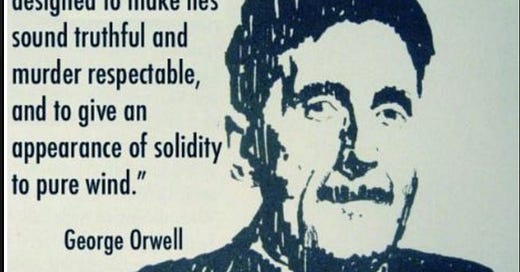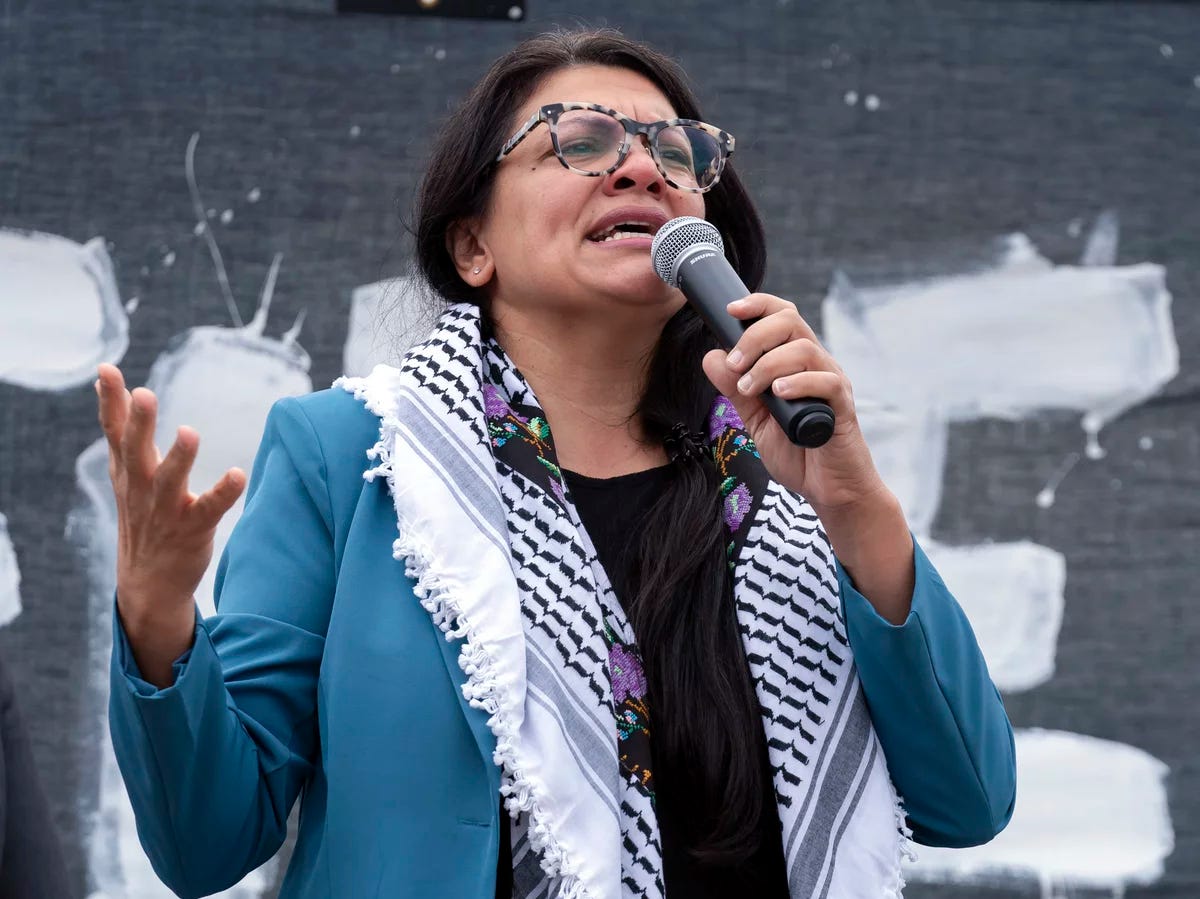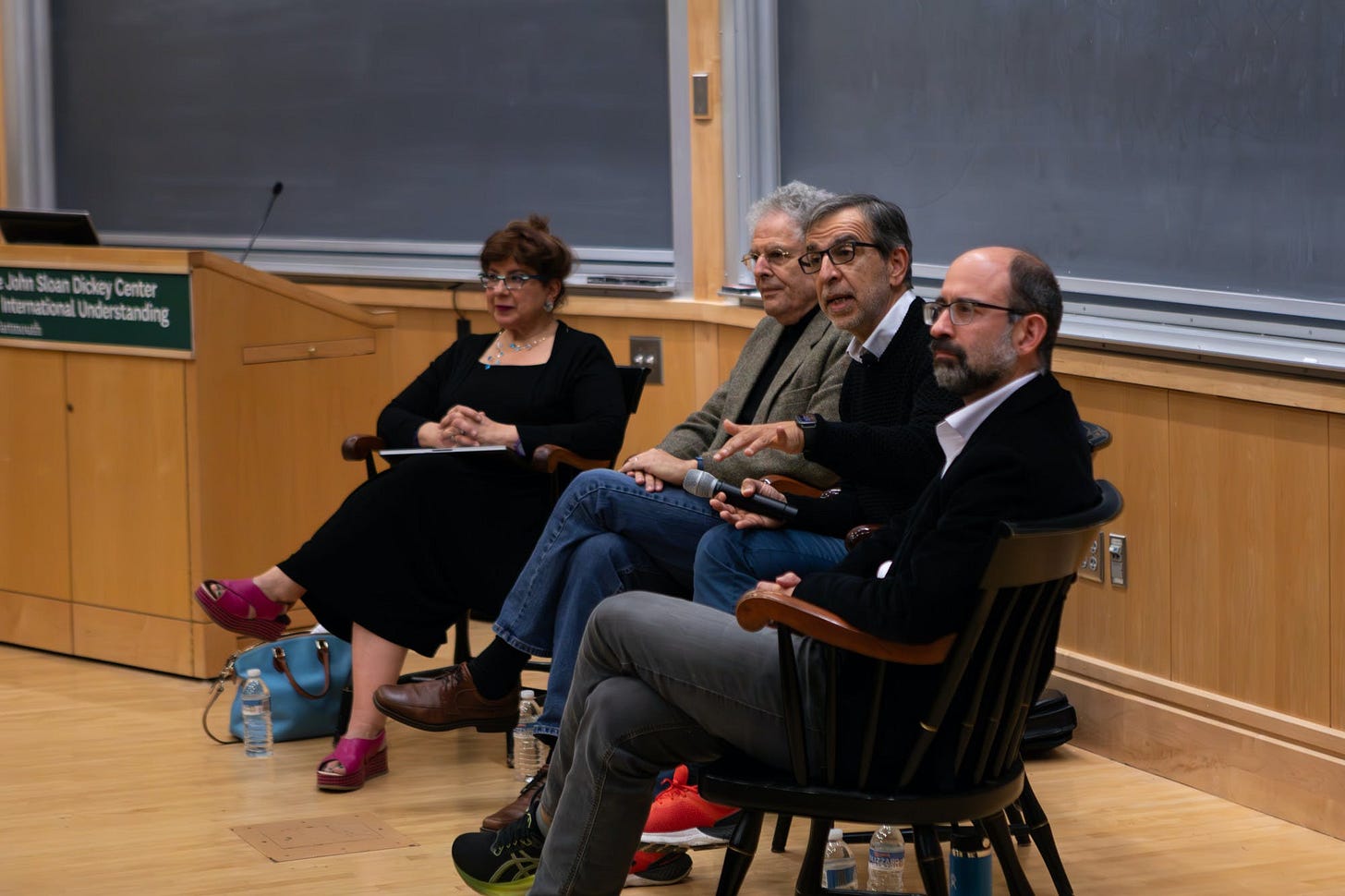The Language of Ignorance
How too many pro-Palestinian students reveal their lack of knowledge
In 1949, a year after the founding of the modern state of Israel, George Orwell coined a phrase that nearly 75 years later bears new consideration. His term, “newspeak,” referred to a fictional language in his book “1984” that was designed to “diminish the range of thought.” Phrases and idioms were fashioned, he wrote, to “provide a medium of expression for the world-view and mental habits proper” to a particular group and “to make all other modes of thought impossible.”
An insightful piece today in The New York Times about the split between Jewish and Palestinian students on campuses brought Orwell’s brilliant wordsmithing to mind. The story in part noted language adopted by pro-Palestinian activists, saying: “Referencing resistance movements, the pro-Palestinian cause is ‘anticolonial.’ Echoing the struggle against institutionalized racism in South Africa, Israel is an ‘apartheid regime.’ Resonating with the concern for Native American land rights, the Palestinians are ‘Indigenous peoples.’ Gaza is a form of mass incarceration, ‘Israel’s open-air prison.’”
Such terms resonate loudly in some academic circles, which is likely why pro-Palestinian students (and, sadly, some of their teachers) use them. They sport such phrases on placards at protests and trot them out for reporters who cover their events, latching onto the jargony quotes.
In the context of Israel and Palestine, such phrases amount to mindless blather. Not only are they historical and political distortions, but the reality is the opposite of their true meaning – much as was true in Orwell’s fictional world.
To wit, how could Israel be regarded as “colonial” when Jews have lived in the land for millennia? (To cite the blindingly obvious, my Christian friends might remind the activists that, um, Jesus walked about Jerusalem and environs quite a while ago.) As for “apartheid,” check out Israel’s racial diversity, which includes Jews and non-Jews from around the globe. On “indigenous peoples,” see the history of Jews in the land; it’s simply factual that Jews have long lived there with equally indigenous Arabs. As for the “open-air prison,” one can only wonder what Gaza would be like if Hamas had chosen to develop an economy there instead of building tunnels and rockets.
Beyond the sloganeering by the Palestinian students, however, what is disturbing is the apparent depth of their ignorance as they bandy the phrases about. Presumably, these are bright folks. So how is it that some of our most esteemed universities have failed to school them in basic history and politics about the region? If they knew more, would they drop the bumper-sticker nonsense?
There are legitimate arguments to be made about denied rights and disrespected claims among Palestinians in Israel, as well as in Gaza and the West Bank. A recent NPR piece about Palestinian olive farmers makes the point well. Moreover, the deaths of innocents caught in Israel’s counterattack on Hamas are repugnant to any civilized people (although the fault there lays with Hamas for, among other things, barring Gazans from fleeing south as Israelis told them to).
Indeed, it is heartening that Israel is now pausing its siege periodically to allow more to flee combat zones. What nation, retaliating against brutal attacks and attempting to vanquish its enemies (i.e., Hamas), does that sort of thing? And Israel is doing so even as Hamas continues to hold hundreds of innocents hostage (what nations hold children and others hostage)?
A basic scan of history shows how Jews and Arabs have been fighting over the land for at least a century. Even today, Jews remember all too well the 1929 riots in which Arabs attacked them, murdering many. Such fighting goes back well before the refusal of Arabs to accept a 1947 United Nations plan to partition the land and the subsequent assault on the burgeoning Jewish state by surrounding Arab nations. Indeed, upon Israel’s creation, many Arab nations persecuted and expelled Jews who had lived in the countries for centuries.
One scary possibility that journalist Thomas Friedman raised is that Israel may again face such a multi-front assault: “… Israel is facing threats from a set of enemies who combine medieval theocratic worldviews with 21st-century weaponry — and are no longer organized as small bands of militiamen but as modern armies with brigades, battalions, cybercapabilities, long-range rockets, drones and technical support. I am speaking about Iranian-backed Hamas, Hezbollah, Islamic militias in Iraq and the Houthis in Yemen — and now even the openly Hamas-embracing Vladimir Putin. These foes have long been there, but all of them seemed to surface together like dragons during this conflict, threatening Israel with a 360-degree war all at once.”
Do the pro-Palestinian students not know of the history in which Israel was born? Have fellow traveling academics at such schools as Harvard and Columbia not themselves learned such history or appreciated today’s dangers (or do they relish those dangers)?
The reality is that Jews and Arabs alike have legitimate claims to the land. Furthermore, Israelis have repeatedly sought arrangements that would permit peaceful coexistence in the land, only to be repeatedly rebuffed by Arab absolutists, some of whom threatened to assassinate any of their leaders who pursued peace. (Yes, Israeli extremists, particularly in the settler movement, take opposing non-compromising stances, but they don’t speak for most Israelis).
Why are such realities not discussed, civilly, on campuses? Why do some politicians, such as Rep. Rashida Tlaib (D-Mich)., embrace the slogan “from the river to the sea, Palestine will be free,” a phrase that calls for the extinguishment of Israel? Tlaib was rightly censured for that bit of foulness, including by more than 20 Democrats in the House.
It’s unquestionable, I believe, that Arab and Jewish students alike (as well as faculty members) have the right to raise their voices in defense of their peoples. Is it morally defensible for Palestinian supporters to fail to condemn the October 7th savagery by Hamas in southern Israel, though?
Indeed, it is mind-boggling that more than 170 faculty members at Barnard and Columbia would issue a statement suggesting that Hamas’s brutalizing of innocents “represented a military response by a people who had endured crushing and unrelenting state violence from an occupying power over many years.” It is simply morally vacuous for them to argue that “One could regard the events of Oct. 7 as just one salvo in an ongoing war between an occupying state and the people it occupies.”
Given the passions stirred by this ugly war, it’s not surprising –- though it is disturbing -- that some Jewish and Palestinian students feel physically in danger on their campuses. The groves of academe are not insulated from the furies of the world outside.
However, there are campuses on which dialogue (and study) takes the place of bumper-sticker views and danger. Perhaps the best example is Dartmouth College, where Palestinian and Jewish academics could rely on years of cooperation to stage civil discussions about the troubles. The Dartmouth Jewish Studies and Middle Eastern Studies departments brought a couple academics in for a recent forum to shed light, not heat, on the war.
They brought in Omar Dajani, a law professor at the University of the Pacific and the son of a Palestinian refugee who has served as a legal adviser to the Palestinian negotiating team in peace talks with Israel, along with Mira Sucharov, a political science professor at Carleton University in Canada, whose family lives on a kibbutz that came under attack by Hamas militants on October 7th. The pair have long collaborated.
“Our friendship and collaboration is based on common values, and articulating those values constantly and continuously has helped us weather the storm of the last three weeks,” Dajani told a Dartmouth interviewer. “We don’t have identical views about everything, but we have near identical values. And so, as we undertook to think about the future of Israel-Palestine, we are guided by a desire to see equality and mutual self-determination realized in that space. When you build a relationship and you also connect on values, it’s possible to weather a lot of storms, and that feels really fortifying in a period like this.”
For her part, Sucharov, a former columnist for the Israeli newspaper Haaretz and a scholar of Israel-Palestinian relations, said in the work of confronting the Israeli-Palestinian conflict people of good faith must understand “that it is a country whose peoples are haunted by trauma. For Jews, of course, the Holocaust, and for Palestinians, it’s the Nakba,” she said, referring to the mass displacement of Palestinians during the 1948 Arab-Israeli war.
Understanding history is essential if one is to move beyond sloganeering. And building bridges, as the Dartmouth program seeks to do, seems far more preferable to mounting competing rallies, shouting one another down, and in the worst cases, attacking one another.







